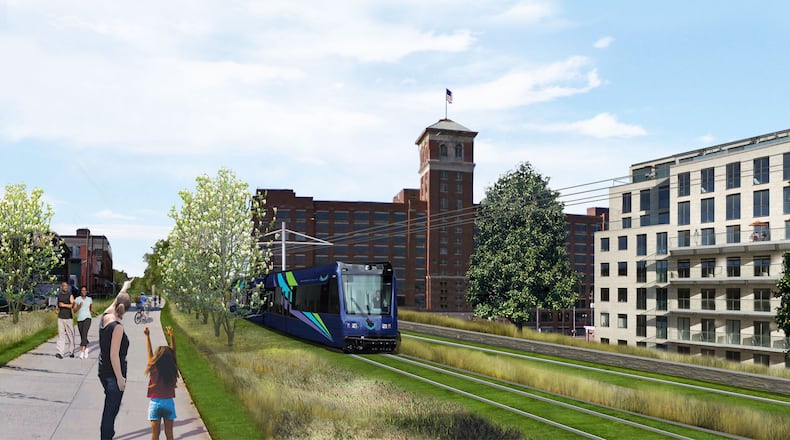In July, I wrote a column saying that squeezing a streetcar onto the popular and crowded eastern portion of the Atlanta Beltline may not be the best use of limited resources.
The plan is to extend the streetcar from downtown’s currently underused line up the Beltline to Ponce City Market. The planned route would be 2-plus miles and cost $230 million (probably more) of Atlanta’s limited “More MARTA” sales tax money.
For years, the idea sailed along unopposed. I mean, everyone likes streetcars. Or the idea of them.
After my column, I got a text from a Beltline developer thanking me for the story. He, too, had “serious concerns.”
He explained why he and others like him were keeping their heads low. “Today, if you express concerns with Beltline Transit, it is tantamount to being a Trump supporter to the Transit Now crowd. Kind of crazy.”
Yep, there’s antipathy out there for those who say the project might be a boondoggle. And few people doing business in sky-blue Atlanta want to be lumped in with those in bright-red MAGA ballcaps.
Last month, some Atlantans who oppose the streetcar extension came out with a group called Better Atlanta Transit to “kick off a public debate on the wisdom of building rail on the Beltline.”
Dutifully, Ryan Gravel, founder of the Beltline, went to social media to bash them: “There’s something maga about this new transit hate group,” he wrote.
I looked at the list of 18 advisory board members — Georgia Tech professors, a couple of former pols, a lawyer, a couple of (green) developers, etc. Maybe there’s one Trump vote in the lot. But, these days, if you oppose Rail on the Beltline, you just might as well have a laminated photo of Benito Mussolini in your wallet.
“If your lucky, they’ll call you a NIMBY,” said Hans Klein, a Georgia Tech professor, referring to the acronym for Not in My Backyard. “Otherwise, you’re a racist, an elitist or a MAGA.”
Klein said “the original assumption was that if you want developers, you have to build rail.” But the developers built anyway. And many now don’t want rail. I’ve talked with several.
Gravel (who didn’t get back to me with a comment for this column), was a Georgia Tech student in 1999 when he wrote a thesis proposing what came to be the Beltline.
In the past, he has told me the city has been “committed (to rail on the Beltline) for 18 years; we’ve had money for seven. We’re dragging our feet. I’m frustrated.”
“It comes to the question, ‘Are they going to build the rail or not?” he added. “The city of Atlanta and thousands of people have for years have consistently said, ‘This is what we want.’ "
Well, maybe not everybody. The new group just released poll results that say most Atlantans want to keep the Beltline as it is.
The poll of 600 registered Atlanta voters last month found 53% of respondents prefer that MARTA improve its current services, rather than expand streetcar, while 43% disagree.
And 53% say rail would destroy what is currently a beloved linear park.
Also, 50% prefer using the space now set aside for the streetcar to create a parallel lane for bikers and scooters and other contraptions that can run you over, while 24% disagree. (If you’ve strolled there on a busy afternoon, you’re taking your life into your hands as those practicing for the Tour de France whiz by).
The folks from Beltline Rail Now! (of course, it has an exclamation mark!) say they have received support from 12 of the 16 NPUs (Neighborhood Planning Units) they approached. There are 25 in the city.
Credit: Curtis Compton / Curtis.Compton@
Credit: Curtis Compton / Curtis.Compton@
The document has letters from NPU leaders in favor of the project. Several say there is federal funding available, so this is a no-brainer.
Except.
Except, there won’t be federal money. The transit agency has chosen not to seek federal funding for the project, and has instead submitted grant proposals for others. It seems the experts — the technocrats at MARTA — have a hunch the feds won’t think this is a good use of U.S. Transportation resources.
Therefore, Atlanta will have to fund the entire $230 million (or however much it will be) project with limited More MARTA money. That is the half-penny sales tax approved by Atlanta voters in 2016. The plan carried a hefty wish list that got boiled down considerably this year as inflation and reality sank in.
In April, MARTA board members voted unenthusiastically for the plan.
Board member Bill Floyd, the former mayor of Decatur and a “yes” vote, said, “I have some issues with this” but added, “it’s an Atlanta issue” and “it’s their money.”
It’s mainly because Mayor Andre Dickens is insistent on it getting built. As I’ve said, mayors like to point and say, “I built THAT!”
On Tuesday, Dickens texted me, saying he’s a longtime Beltline fan.
“With so much money and potential impact on the line, I’m all for a healthy dialogue about the future of BeltLine transit,” he wrote. “Hash out the pros and cons with updated projections, renderings, methods and experiences.”
Or maybe just be prudent and build a bike lane and spend the money for other, more needed projects.
About the Author
Keep Reading
The Latest
Featured





